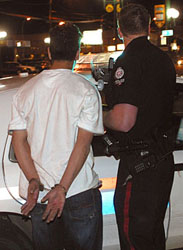Self Incrimination
 The Fifth Amendment of the United States Constitution states that no one should be compelled in any criminal case to be a witness against himself. This statement grants people the right to refuse making any statement or answering any question that would establish that the individual had committed a crime.
The Fifth Amendment of the United States Constitution states that no one should be compelled in any criminal case to be a witness against himself. This statement grants people the right to refuse making any statement or answering any question that would establish that the individual had committed a crime.
If you have ever watched a court drama, you have probably heard a defendant or witness say "I plead the Fifth." In pleading the Fifth, the individual refuses to answer a question because the response could be self-incriminating.
During a criminal trial, the Fifth Amendment gives the defendant the right to avoid taking the witness stand. The judge, the prosecutor, and the defendant's attorney cannot make the defendant testify if he or she does not want to.
Should the defendant choose not to testify, the jury is not allowed to take the refusal into consideration when determining if the defendant is guilty of the criminal charges.
If, however, the defendant does choose to take the stand, his or her Fifth Amendment privilege is waived when testifying. This means that the defendant may not answer some questions and refuse to answer others.
During a criminal trial, the defendant is not the only one who may invoke his or her Fifth Amendment privilege. If a witness feels that answering a question would implicate him or her in a crime, he or she may plead the Fifth. Unlike the defendant, a witness may be forced, or subpoenaed, to testify.It is for that reason that the witness may exercise his or her Fifth Amendment privilege by refusing to answer specific questions or perform tests, such as a breathalyzer test or field sobriety exercises.
In 1966, the United States Supreme Court ruled in Miranda v. Arizona that the Fifth Amendment right against self incrimination meant that police officers must advise a suspect of his or her right to remain silent and to get an attorney while in police custody. Today these are referred to as Miranda Rights.
While the Fifth Amendment right does protect a defendant from being a witness against himself or herself, the privilege does not extend to fingerprints and blood or DNA tests. This means that a defendant may not refuse to participate in these procedures by invoking the Fifth Amendment privilege.
www.copyright.gov
Copying,�reproduction, or duplication of the content, web design, or look and feel is strictly�prohibited.
DISCLAIMER: SearchandSeizure.Org HAS SUPPLIED THE INFORMATION ON THIS WEBSITE FOR INFORMATIONAL PURPOSES ONLY. THE INFORMATION ON THIS WEBSITE MAY NOT BE 100% ACCURATE AND SHOULD NOT BE INTENDED AS LEGAL ADVICE. THE USE OF THIS WEBSITE DOES NOT CREATE A LAWYER-CLIENT RELATIONSHIP.HIRING AN ATTORNEY IS A VERY IMPORTANT DECISION. BEFORE HIRING AN ATTORNEY IT IS IMPORTANT TO ASK FOR WRITTEN AND VERIFIED INFORMATION ABOUT THE ATTORNEYS QUALIFICATIONS AND EXPERIENCE.
Copyright � 2009 . All Rights Reserved.